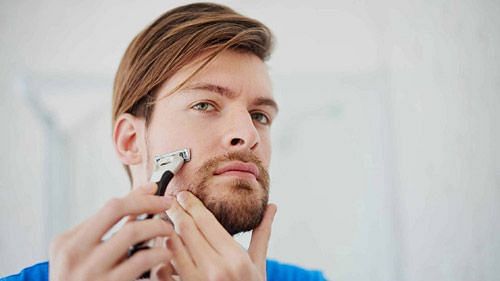Shaving Burns vs. Shaving Bumps: Types, Causes & Cure
Razor burn and bumps occur after shaving and can cause a stinging pain. Want to know more about the itchy razor rashes & razor bumps? Read here.

When you look good, you feel good. Appearance adds to the confidence of many, and grooming forms an important part of appearance. However, in many cases, grooming activities like shaving can be a catch-22 situation; where manscaping hair off the chest, legs, face, or pubic area is easy but if not done appropriately, the aftereffects can be troubling.
Dealing with these aftereffects of shaving, like itchy razor burns or razor bumps, can be any guy’s nightmare.
Razor burns are one of the major concerns among men, and everyone should know how to deal with it. Read further to find further about shaving burns and razor bumps on face and the possible remedies for it.
What is a Razor Burn?
Razor burns are one of the most common problems that cause skin irritation on shaving sites; legs, chest, face, or pubic area. Similar to haircut bumps, they cause inflammation and reddening of the skin, along with a burning sensation after shaving.
Now, this might last from a few hours to a few days. Sometimes, dry shaving or aggressive shaving with a blade may cause rough friction against the skin, which results in red, itchy and burning sensations on the shaved area.
In some cases, the shaved area may develop into, what we call as, the razor bumps.
What Are Razor Bumps?
Razor bumps are usually caused by ingrown hair that grows in the wrong angles and curl back to grow into the skin. This causes red pimples and bumps after shaving.
Some also experience red bumps and darkening of the skin after shaving. Slightly different from razor burn, this is also called shaving bumps.
Razor bumps or pseudofolliculitis barbae are most common in men with curly hair and thus a prevalent condition in parts of Africa.
How are Razor Burns & Razor Bumps Different?
Razor burns and razor bumps, though used interchangeably, are much different from each other.
While razor burns could be experienced just after shaving followed by tightness, reddening, itchy and stinging skin, red bumps are closely related to bumps or lesions on the skin.
Razor bumps occur when the shaved hair grows back and forms an ingrown hair. Ingrown hair generally grows into skin when the hair is removed by plucking or waxing. It causes your hair to grow at different angles, eventually leading to pimples after shaving.
What are Different Types of Razor Burns?
Razor burns or razor rash could possibly be found anywhere where you have used a razor. It can be on your face, on your neck, legs or even the pubic areas.
Sometimes, shaving rash is followed by shaving bumps as well. Here are different types of razor burns a person may experience after shaving.
- Razor Burn on Face: The most common site for razor burn on face is the neck. It causes a reddened neck and rashes on skin. Sometimes razor rashes on the face might be followed by bumps.
- Razor Burn on legs: Your legs might develop red rashes and sometimes razor bumps on legs due to excess ingrown hair.
- Razor Burn Pubic area: Your pubic area is the most sensitive part, and using razor on a sensitive area can cause irritation. Hence, razor burn pubes are common in the pubic area.
What are the Effects of Razor Burns on Skin?
- Right after shaving, you might experience some tenderness or a burning sensation on your skin. This is the most common scenario in people with sensitive skin.
- You might even find your face and legs itch after shaving to the extent that you may crave to itch till the skin turns red.
- In some cases, you might develop rash after shaving, followed by various bumps. If you have extremely sensitive skin, a rash may also develop into pimples after shaving your face.
Symptoms of Razor Bumps
The primary symptoms of red bumps include red and raised bumps on shaved areas.
This bump might further lead to itchy and painful skin. Pubic razor bumps are one of the most common in men who shave repeatedly.
Razor bumps take longer that razor burns to appear on skin and also leads to :
- Darkening of the skin
- Solid round bumps or small papules
- Pus-filled lesions
- Scars on skin
Razor Burns & Bumps In Men
Right from when a man takes up razor, shaving burns and bumps, or pimples after shaving face, becomes a common phenomenon, especially for people with sensitive skin.
Most men with curly hair or coarse hair get a burning sensation right after the shaving. These burns and itches might occur anywhere after shaving. To add injury to the insult, some men may also notice razor bumps due to the ingrown hair. They are more common in sensitive areas like the neck and genitals that experience friction.
When the free edge of hair gets trapped under the skin, it develops into a bump or a pus-filled cyst. Luckily, we have got some amazing home remedies to treat the shaving bumps.
What are the Ways to Treat Different Kinds of Razor Burns?
Both razor burns and razor bumps can go away within a few days or few weeks. If you have an urgent meeting or a date, you might want to know the razor burn treatment to cure it in a tick.
Some home remedies might help you against different kinds of red razor rash on your skin.
- For Heat or Itching: A cold compress or a washcloth provides instant relief against the skin burns on your face or legs. For shaved rash pubic area treatment, you can apply aloe vera gel or avocado oil on the pubes.
- Treating Dryness: Razor burns could also lead to dry skin. If you are experiencing that, rinse your skin and pat it dry. After a few seconds, apply an emollient or a skin lotion/moisturiser to avoid dryness.
Alternatively, you can use coconut oil to hydrate the skin and avoid irritation.
- Razor Bump Treatment: Besides the razor burns, you might also develop the razor bumps on the face or pubic area. Razor bumps might get fine within a week or two. If it doesn’t, you can use a razor bump cream like cortisone against inflammation.
Some common home remedies for razor bumps are use of almond oil, aloe vera gel or an oatmeal soak to relieve itching.
Tips to Avoid Razor Burns
There are some tips that you might want to consider, to avoid the irritating shaving rash and shaving bumps on your skin. Focus on improving your shaving habits to avoid unnecessary rashes.
- Regular Skin Exfoliation to remove dry and dead skin cells.
- Wash your face with warm water 10 minutes before shaving.
- Apply skin lubricant or moisturiser to avoid dryness.
- Remember to replace razor blades frequently.
- Lastly, always shave in the direction that hair grows.
- Use clean hair trimmers and trim in the right direction.
Conclusion
Now, you might have understood the difference between a razor rash and a razor bump. Most of these bumps and rashes would go away with time.
If it doesn’t, you can use the above-mentioned methods as a bump stopper. However, the skin bumps might even cause excessive darkening or don't go away in a time frame.
That’s when you need to consult a skin dermatologist to treat your shaving bumps.
Sources
https://www.healthline.com/health/beauty-skin-care/razor-burn#outlook
https://www.healthline.com/health/beauty-skin-care/razor-burn

